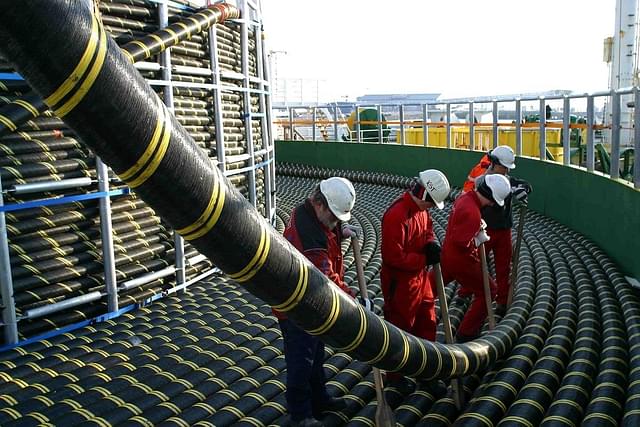Commentary
Why Subsea Cables Are The New Flashpoint In The US-China Relationship

Sub-sea cables. (Picture Credit: thorneandderrick.com)
The next stage of the spy game is already unfolding: the “tampering of undersea cables" that ferry internet traffic across the Pacific Ocean by Chinese repair ships.
Commercially available shipping data reveals numerous gaps in the location tracking of vessels operated by S B Submarine Systems (SBSS), a state-controlled Chinese company that specialises in repairing international cables.
Globally, over 400 cables run along the seafloor, carrying more than 95 per cent of all international internet traffic, according to TeleGeography, a Washington-based telecommunications research firm. These data conduits, which transmit everything from emails and banking transactions to military secrets, are vulnerable to sabotage and espionage.
SBSS is part of a regional consortium that deploys ships to repair these cables, including some owned by Silicon Valley giants such as Google and Meta. The repair process involves lifting the cables to the surface, resplicing the broken fibers that carry internet data, and then returning the cables to the ocean floor.
So far, so good. But here's the grey area: these cable repair ships could be a major security threat. They might be covertly tapping into undersea data streams, mapping the ocean floor to locate U.S. military communication links, or stealing valuable intellectual property from cable equipment.
A US military official told Wall Street Journal that these ships might also be laying cables for the Chinese military.
Justin Sherman, a fellow at the Cyber Statecraft Initiative of the Atlantic Council, a Washington-based think tank, told Reuters that undersea cables are "a surveillance gold mine" for intelligence agencies worldwide.
For the US, the primary concern is securing cables that carry sensitive data to American military bases and other assets in the Pacific and globally. Despite being encrypted, this data often traverses commercial internet lines, increasing security risks.
While gaps in ship-location data can sometimes be due to poor satellite coverage, the unexplained gaps for SBSS-operated vessels are unusual and raise suspicions.
This isn't merely a conspiracy theory. The potential for undersea cables to become a conflict zone was highlighted in April 2023 when two communications cables connecting Taiwan with its Matsu islands near the Chinese coast were cut.
The 14,000 residents of these islands were left without internet. Taiwanese authorities suspected a Chinese fishing vessel and a Chinese freighter caused the disruption, but they refrained from calling it a deliberate act due to a lack of direct evidence against the Chinese ships.
With Washington worried about espionage risks, the Biden administration has already alerted companies like Google and Meta about the threat to US-owned cables, with SBSS being a primary concern.
To be fair, there is no direct evidence of nefarious intent by the Chinese ships, but Beijing's past actions have sown distrust.
This is why the US government is employing a mix of incentives and warnings to curb China's ambitions as it seeks to dominate the subsea cable ecosystem.
The US effort includes funding multiple Pacific cable projects and supporting SubCom, a US-owned cable ship company, to ensure readiness for critical repairs or emergencies, under a program partly managed by the Pentagon.
However, industry analysts believe that shifting responsibility for fixing Asian cables away from Chinese vessels could pose a tougher challenge due to the ageing fleet of repair ships.
While concerns regarding SBSS' alleged espionage activities remain classified, it is clear that subsea cables are becoming central to the US-China tech war.
When Nathaniel Fick, the State Department's top cybersecurity official who was testifying at a congressional hearing in January this year, said, “I believe when our adversaries tell us what they intend to do, we should believe them,” he laid threadbare the danger lurking around the corner.
Support Swarajya's 50 Ground Reports Project & Sponsor A Story
Every general election Swarajya does a 50 ground reports project.
Aimed only at serious readers and those who appreciate the nuances of political undercurrents, the project provides a sense of India's electoral landscape. As you know, these reports are produced after considerable investment of travel, time and effort on the ground.
This time too we've kicked off the project in style and have covered over 30 constituencies already. If you're someone who appreciates such work and have enjoyed our coverage please consider sponsoring a ground report for just Rs 2999 to Rs 19,999 - it goes a long way in helping us produce more quality reportage.
You can also back this project by becoming a subscriber for as little as Rs 999 - so do click on this links and choose a plan that suits you and back us.
Click below to contribute.
Latest